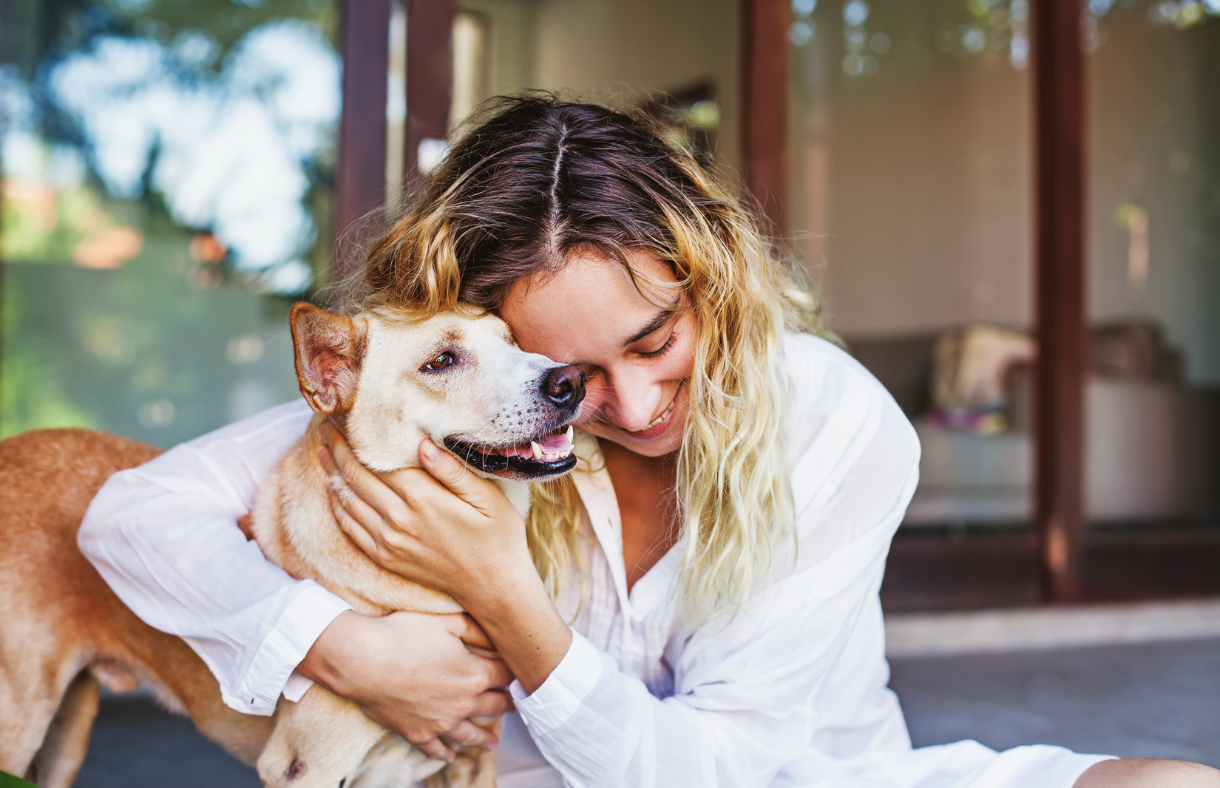Around half a million people in the U.S. keep service dogs trained to help with physical or emotional disabilities. Some 200,000 people have registered emotional support animals that provide a calming presence to help manage mental illness. And often, the help provided by such animals reaches beyond the person they were prescribed for. “Norman, my husband’s PTSD service dog, is so comforting to everyone,” says Marjorie Reichard, Project Manager at BridgingApps. “Our daughter Olivia has medical-trauma issues and is deathly afraid of shots, so Norman has come along on doctor visits to help her feel safe.”
Pets not formally recognized as filling health needs still bring health benefits. (The American Veterinary Medical Association estimates that U.S. population at around 77 million dogs, 58 million cats, and over 10 million animals of other species—not counting companion animals outside of license records and vets’ patient lists.) If you share your household with one or more animals, the odds are in favor of your having lower blood pressure, better overall blood numbers, lower anxiety levels, and better cognitive function.
Here’s why.
Unconditional Acceptance
Even if they’re incorrigible beggars who never feel they get enough treats, dogs and cats rarely berate you for mistakes or tell you to “snap out” of depression. They accept the basic person you are, imperfections and all, which can do wonders for self-esteem. Plus, you can talk to pets about literally anything, without being judged or interrupted.

Good Example
Have you ever seen a cat fretting over what might happen tomorrow? Or a dog sulking during a beautiful day in the park? Even if you have emotional disorders that make it impossible to carry an optimistic attitude 24/7, the presence of a contented animal guarantees that some enthusiasm and/or relaxation will rub off on you. Speaking of rubbing and associated behaviors: there’s scientific evidence that a cat’s purr generates not only contentment but literal physical-healing benefits.
Responsibility
For many people with depression, a four-legged dependent is their primary motivator to get up in the morning. That persistent nudging or meowing also helps cultivate the healthy habit of getting up at the same time each day. And where someone has disorders that make it difficult to connect or communicate with other people, animals often provide a natural starting point.
Physical Exercise
Dog owners, especially, appreciate the incentive their pets provide for daily exercise and outdoors time. While cats don’t typically beg for walks, they love to play “chase the string” and other games that require your physical participation. Even cage pets add activity to your day as you go back and forth to feed them, change their water, and bend/stretch/lift to fetch their supplies. “Even a fish has needs,” notes Reichard.
Marjorie Reichard on What Pets Give Us
- Olivia really relies on her cat Ryder for comfort when she is upset. He’s the only one besides me she feels comfortable telling her problems to.
- Toby the dog always senses when I have a need for snuggling and sitting quietly.
- Our daughter Maddy’s cat, Hazel, is helping Maddy show more nurturing behaviors and become more aware of others’ needs.
- My husband does not particularly like to walk, but the dogs need it, and he gets out twice a day because of them. And they keep him company while he walks.
Should I Get a Pet for My Health?
Of course, to some people an animal’s needs are more bother than motivation—plus, if you have physical disabilities that limit your movements, you may be unable to properly care for a pet by yourself. At any rate, don’t adopt an animal on impulse and then blame it for being too much trouble. Human–pet relationships, like human–human relationships, are easily ruined by one party’s impossible expectations.
“It is sad to see a dog being yelled at constantly,” says Reichard, when the real problem is that “the human doesn’t understand the basics of dog ownership. If you are getting your first dog, get in a training class right away—and recognize that the training is for you as well as the dog.”

Pet Ownership 101
Reichard offers the following additional tips on acquiring and caring for a pet:
- If you have never had a pet before, try fostering before committing to full-time ownership.
- Make a budget. The cost is not just adoption fee and food. Vet bills can be expensive.
- Do advance research on what type of animal would best fit your lifestyle. If you are a couch potato or live in a small apartment, a Labrador puppy is not your best choice. Don’t adopt a puppy at all unless you definitely have time for their high energy and extra training needs. There are lots of older dogs who need homes.
- Remember that dogs need to be walked every day—more often if they’re young or you don’t have a fenced yard.
- Look for tech tools that can reduce your workload. For example, we have an automatic cat litter box that requires little daily maintenance. Still, I can’t stress it enough: Keep that cat box clean!!!
- Do not feed your pet table scraps. It encourages them to pester you while you’re eating, and human scraps aren’t as healthy as food made for pets.
- Be willing to consult a professional if your pet has persistent behavior problems. And remember, a change in your behavior can often bring about an amazing change in a pet.
If you haven’t figured it out by now, pets are a lot of work—but they more than pay us back in health and affection benefits. Reichard concludes: “Pets are an awesome addition to a family. They provide companionship, love, and a reason to get out of bed and go for a walk.”
Need more help? The BridgingApps database has a selection of tech-tool recommendations you can use in caring for or learning about pets.

